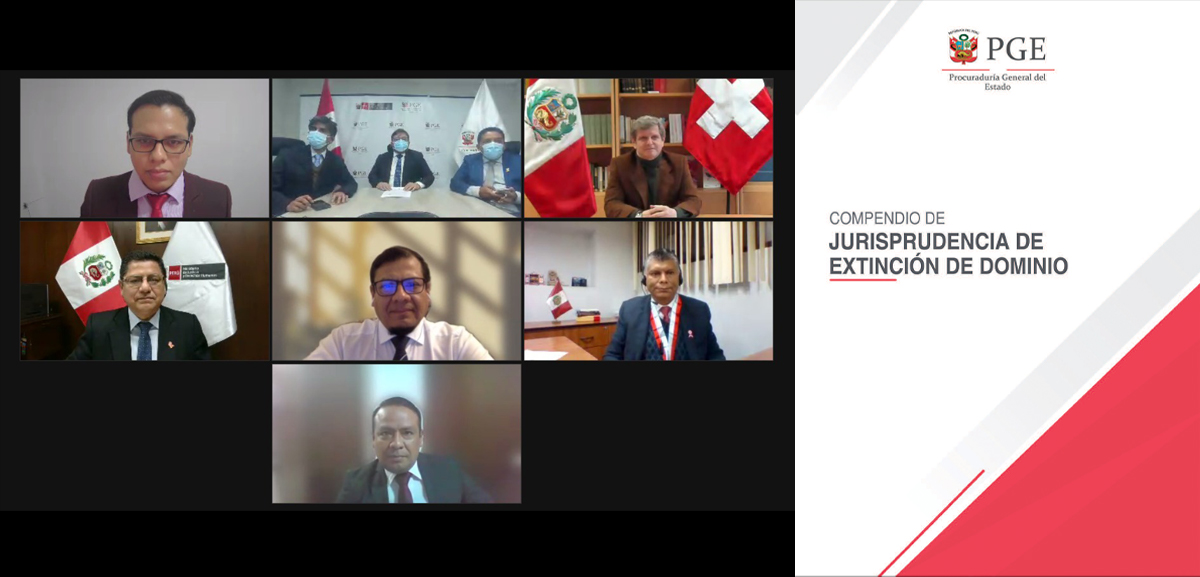Launch of compendium of jurisprudence on Peru’s non-conviction based confiscation law

A newly published Compendium of Jurisprudence on Extinción de Dominio will enable Peruvian judges, prosecutors and other law enforcement actors to assess progress and legal precedents in the implementation of Peru’s 2019 law on non-conviction based confiscation (Extinción de dominio).
The 1,100-page document compiles all judgments relating to the Extinción de dominio law issued by the judicial authorities in 2019 and 2020.
The compendium is a collaboration between Peru’s Procuraduría General del Estado (Special State Attorney General) and the Basel Institute on Governance, with the support of our Swiss-funded Subnational PFM Strengthening Programme and our International Centre for Asset Recovery (ICAR) team in Lima.
The jurisprudence reveals that Peru has already recovered around PEN 163 million (approximately USD 41 million) using this legal mechanism. This makes Peru a leader in Latin America in the use of such non-conviction based confiscation mechanisms. It is also the first country to have enforced these type of laws in international financial centres.
Much of this experience will be invaluable to lawmakers and practitioners in other countries that are considering introducing similar laws.
Opening up asset recovery possibilities for Peru
Extinción de dominio is a law that allows Peru to recover money and other misappropriated assets without the need for a criminal conviction. As such, it is particularly valuable in recovering the proceeds of grand corruption schemes, where the perpetrators may have died, fled the jurisdiction or otherwise be immune from prosecution.
Among the legal precedents set so far, a notable point is the high potential of this law in the context of international asset recovery. In December 2020, for example, Switzerland, Luxembourg and Peru signed a tripartite agreement to return approximately USD 26 million in assets that had been confiscated by Peru under the Extinción de dominio law.
High-level launch event
The compendium was launched at a high-level virtual event on 15 July 2021. The event was attended by the Minister of Justice and Human Rights Eduardo Vega Luna, the Swiss Ambassador in Peru Markus Alexander Antonietti, the Special State Prosecutor General Daniel Soria Luján, and representatives of the Basel Institute and Ministry of Justice and Human Rights.
Speaking at the event, the Basel Institute’s Head of Latin America, Oscar Solórzano, said:
“Non-conviction based confiscation mechanisms are increasingly being recognised as an important complement to traditional criminal confiscation, fines, civil reparations, disgorgements and other tools against economic crime.
In this context, Extinción de dominio is a criminal policy tool that must be integrated into the national legal framework. It needs to occupy the place that the Peruvian legislator has assigned to it, respecting clear principles of proportionality and due process.”
Sergio Jimenez, leader of the asset recovery component of the PFM Programme, spoke about the application of the tool in the context of recent cases.
Minister Vega Luna praised the compendium, calling it:
“A great support in the fight against the criminality that is proving so damaging to Peru and to the world.”
More
- View and download the Compendio de Jurisprudencia de Extinción de Dominio.
- See the Twitter announcement issued by the Ministry of Justice and Human Rights (in Spanish).
- Download the speech of Oscar Solórzano (in Spanish): La política criminal moderna y el rol de la recuperación de activos.
- See how Peru recovered USD 8.5 million in proceeds from a corrupt arms deal from a Swiss bank account held by businessman Moshe Rothschild Chassin.
- Read a detailed case study of how extinción de dominio has enabled the confiscation of USD 1 million in assets intended for terrorist financing – The Nun: Confiscating assets of the Shining Path terrorist organisation (also available in Spanish).



